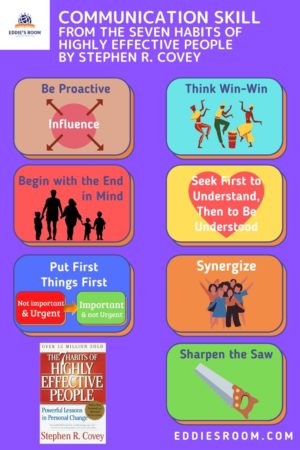We have to change ourselves
What I learn from this book is if we wanted to change our situation, we had to change ourselves first. But we tend to expect someone to change to improve the situation.
Actually, it is much more difficult to change someone’s opinion or attitude than to change ourselves. I would say it’s almost impossible.
For example, I want my son to be a great kid, but in fact, paying attention to him, encouraging him, and scolding him, those my actions often don’t work. Instead of trying to change my son, we can change our perceptions and expectation. We can love and acknowledge him even if my son is not a great boy as I wanted.
Obviously, it takes a lot of time and effort to get good academic results and score goals in soccer to meet parents’ expectations. But I can change my perception and expectation in a second. It takes just a second and it totally depends on me.
This positive attitude leads to Habit1.
Habit1: Be Proactive
Principle of Self-Responsibility
The author explained, “Responsibility is the ability to choose our response.”
This is similar to what I learned from Buddhism how to react to worries. We don’t need to React to worries.
I like the concept of expanding the circle of influence. So we should focus on what we can influence directly and indirectly. And we have to accept things that we can’t affect and choose not to react to them. Sometimes we complain about a situation that we can’t change. For example, weather, a government rule, or an event in past.
I like the one side story about Love.
Love is a verb. The feeling of love is only the result of the act of love. Serve your wife. Make a sacrifice for your wife. Listen to your wife. Understand your wife’s emotions. Express your gratitude. Agree with your wife. After those actions, you will realize you loved your wife. Your action controls your feeling.
Habit2: Begin with the End in Mind
Principle of Self-Leadership
It was a shock to me that this chapter started with thinking of my funeral. The author asks, what do you want your family and friends to say about you?
The answer contains the most important goals of your life.
So the author recommends making a mission statement in order to clarify what is important for my life.
Then I try to balance my family, my work, and my own life and made it.
Habit3: Put First Things First
Principle of Self-Management
I like the Time management matrix because it can remind me of the importance of shifting my time from the “Urgent & Not-Important” task to the “Not-Urgent & important” task. It’s a simple but powerful matrix.
Habit4: Think Win-Win
Leadership Principles in Relationships
The Problem of performance could be a good opportunity to improve the performance capability. For example, we can interpret a child’s problems as a good opportunity to build a relationship with the child, rather than just trouble or obstacle. This will change the parent-child relationship and make a Win-Win situation.
And the author explained great courage and consideration are required to make a win-win relationship. Even if we have courage but don’t have consideration, we will win and the opponent will lose. On the other hand, even if we have consideration but don’t have courage, we will lose and the opponent will win.
So the balance between courage and consideration is the essence of a Win-Win relationship.
Habit5: Seek First to Understand, Then to Be Understood
Communication principles of emotional empathy
This habit is the basement of our communication and I fully agree with those points.
Because you so often listen autobiographically, you tend to respond in one of four ways:
- Evaluating: You judge and then either agree or disagree.
- Probing: You ask questions from your own frame of reference.
- Advising: You give counsel, advice, and solutions to problems.
- Interpreting: You analyze others’ motives and behaviors based on your own experiences.
This is my favorite word.
If I were to summarize in one sentence the single most important principle I have learned in the field of interpersonal relations, it would be this: Seek first to understand, then to be understood.
Habit6: Synergize
Principle of creative cooperation
Simply speaking, 1 + 1 is not 2 and could be 3 or more. That is the power of Synergy.
We leverage each other’s strengths and make up for our weaknesses. We can create new ideas through brainstorming and the interaction of each person’s ideas
Habit7: Sharpen the Saw
Balanced self-renewal principle
We have to maintain 4 area of our life such as physical, social/emotional, mental, and spiritual. And training in these four areas gives us the power to carry out the other six habits. Also we have to be fresh and healty.
Thank you for reading this post.
Please refer to the Franklin Covey website to find the summary of Seven habits of Highly Effective People.


